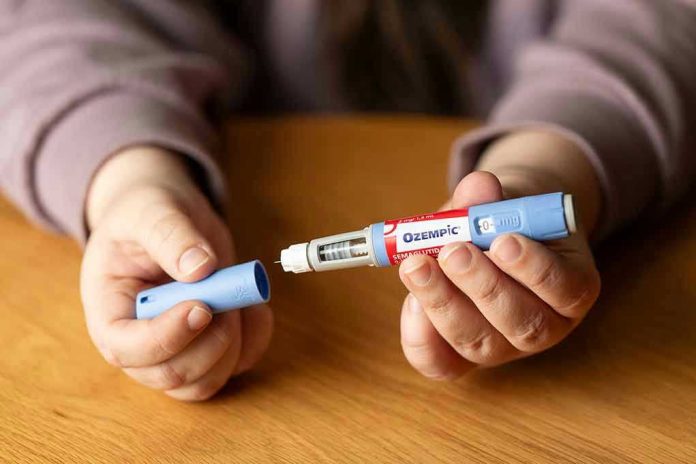
The unregulated peptide gold rush threatens health and safety, echoing past supplement crises.
Story Overview
- Unregulated peptides surge in popularity post-Ozempic.
- FDA warns against counterfeit and compounded drugs.
- Lawsuits highlight severe side effects and health risks.
- Regulatory crackdowns target unsafe weight loss solutions.
Unregulated Peptide Market Emerges
Following the widespread popularity of Ozempic, a drug initially developed for diabetes management, a new wave of peptide-based drugs is sweeping the weight loss and wellness industry.
While Ozempic and its peers were originally regulated, the market has seen a shift toward unregulated peptides that are often compounded or counterfeit. This surge raises significant safety concerns as patients seek quick weight loss solutions, risking their health in the process.
The success of GLP-1 agonists like Ozempic for weight loss has led to drug shortages and a burgeoning black market for peptides. This has prompted compounding pharmacies to produce semaglutide copies, sometimes with unapproved ingredients, further complicating the landscape.
The FDA, alongside other regulatory bodies, has warned against these unapproved and counterfeit drugs, emphasizing the dangers they pose to public health.
Legal and Health Risks Amplified
More than 2,900 lawsuits have been filed against manufacturers of GLP-1 drugs as of November 2025. These lawsuits cite severe side effects, including gastroparesis and vision loss, raising questions about the safety of these medications.
The upcoming Daubert hearing will determine the admissibility of scientific evidence in these cases, potentially setting a significant legal precedent for the industry.
The compounded and counterfeit nature of many of these peptides adds another layer of risk, as patients may be exposed to incorrect dosages or harmful contaminants.
Legal experts note the complexity of proving causation in these cases, highlighting the importance of regulatory oversight to ensure consumer safety.
Regulatory Crackdowns and Future Implications
In response to the growing concerns, the FDA has intensified its regulatory enforcement against unapproved peptide products. By removing Ozempic from the drug shortage list and cracking down on compounding pharmacies, the agency aims to curtail the spread of unsafe drugs.
However, the demand for rapid weight loss solutions persists, driven by social media and celebrity endorsements.
Looking ahead, the weight loss and wellness industry may see stricter regulations on compounding pharmacies and peptide supplements. Pharmaceutical companies could face substantial financial liabilities, with Novo Nordisk alone estimated at $2 billion.
The ongoing litigation and regulatory actions are likely to reshape prescribing practices and patient monitoring, emphasizing the need for safe, regulated treatments.
Sources:
King Law (Ozempic Lawsuit Updates, Nov 2025)
Lawsuit Legal News (Ozempic Lawsuit, Nov 2025)
FDA (Concerns with Unapproved GLP-1 Drugs)
Pharmacy Times (GLP-1 Compounding Controversy)



